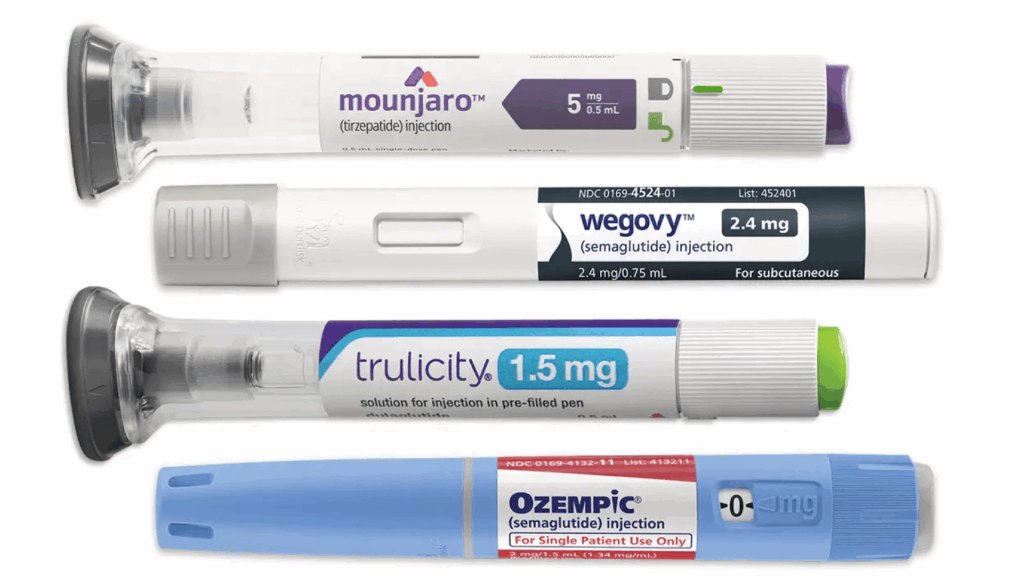In recent years, medical weight loss treatments have surged in popularity—especially weight loss injections. These medications, often prescribed under brand names like Ozempic, Wegovy, and Mounjaro, are designed to help people lose weight more effectively when combined with diet and exercise.
If you’ve been hearing about these treatments and wondering whether they’re right for you, here’s a complete guide to the most common weight loss injection options, how they work, and what to consider before starting them.
How Weight Loss Injections Work
Most prescription weight loss injections work by mimicking hormones in your body that regulate appetite, insulin, and digestion. These hormones—mainly GLP-1 (glucagon-like peptide-1) and GIP (glucose-dependent insulinotropic polypeptide)—help you feel full faster, reduce food cravings, and stabilize blood sugar levels.
When used properly under medical supervision, these injections can help users lose 10%–20% of their body weight over time.
1. Semaglutide (Ozempic, Wegovy, Rybelsus)
Semaglutide is one of the most well-known injectable medications for weight loss. Originally developed to treat type 2 diabetes, it’s now FDA-approved for chronic weight management under the brand name Wegovy.
How it works:
Semaglutide mimics the GLP-1 hormone, helping control blood sugar levels and suppress appetite.
Typical results:
Clinical studies show an average of 15% body weight reduction over 68 weeks when combined with lifestyle changes.
Brand names & administration:
- Wegovy – approved for weight management
- Ozempic – prescribed off-label for weight loss
- Rybelsus – oral version (tablet form)
2. Tirzepatide (Mounjaro, Zepbound)
Tirzepatide is a newer dual-action injectable medication that mimics both GLP-1 and GIP hormones, making it potentially more effective than semaglutide for some users.
How it works:
By targeting two key hormones that regulate appetite and metabolism, tirzepatide helps reduce food intake and improves insulin sensitivity.
Typical results:
In clinical trials, users lost up to 22.5% of their body weight—the most significant results of any injectable medication so far.
Brand names & administration:
- Mounjaro – FDA-approved for type 2 diabetes
- Zepbound – FDA-approved for obesity and weight management
3. Liraglutide (Saxenda, Victoza)
Liraglutide was one of the first GLP-1 medications approved for weight loss. It’s still widely prescribed, though it requires daily injections instead of weekly ones like semaglutide and tirzepatide.
How it works:
Similar to semaglutide, liraglutide helps regulate appetite and slows digestion.
Typical results:
Users often lose around 5%–10% of their body weight over several months.
Brand names & administration:
- Saxenda – weight management
- Victoza – diabetes treatment
4. Other Injectable Options
While GLP-1 and GIP-based medications dominate the market, a few other injectable treatments exist for specialized cases:
- Phentermine + Topiramate (Qsymia) – typically oral, but sometimes used in compounded injectable forms under medical supervision.
- Lipotropic Injections (B12 + MIC) – popular in wellness clinics; not FDA-approved for weight loss but may boost energy and metabolism.
- Insulin & Peptide Blends – experimental formulations offered by some clinics, often without FDA approval, so medical guidance is essential.
Who Is Eligible for Weight Loss Injections?
Weight loss injections are typically prescribed for adults who:
- Have a BMI of 30 or higher, or
- Have a BMI of 27 or higher with at least one weight-related condition (e.g., diabetes, high blood pressure, sleep apnea)
Always consult a licensed healthcare provider to determine if you’re a good candidate and to discuss potential side effects such as nausea, fatigue, or digestive issues.
Are These Injections Safe?
When prescribed and monitored by a doctor, most FDA-approved weight loss injections are considered safe and effective. However, they are not suitable for everyone, especially those with a history of thyroid cancer, pancreatitis, or certain gastrointestinal disorders.
Common side effects may include:
- Nausea or vomiting
- Constipation or diarrhea
- Fatigue or dizziness
- Decreased appetite
Long-term safety data continues to be monitored as these medications gain widespread use.
The Bottom Line
Weight loss injections have changed the landscape of obesity treatment, offering new hope for people who have struggled with traditional methods.
While these medications can deliver dramatic results, they’re most effective when paired with healthy eating, regular activity, and medical supervision.
If you’re considering starting a weight loss injection program, talk with your doctor about which option—semaglutide, tirzepatide, liraglutide, or others—is best suited for your goals and health profile.
Disclaimer:
This article is for informational purposes only and should not be taken as medical advice. Always consult a healthcare professional before beginning any prescription treatment.


